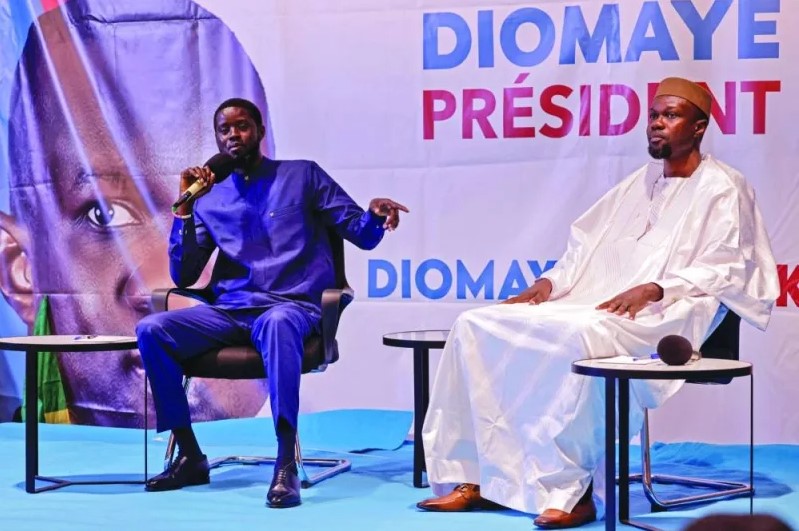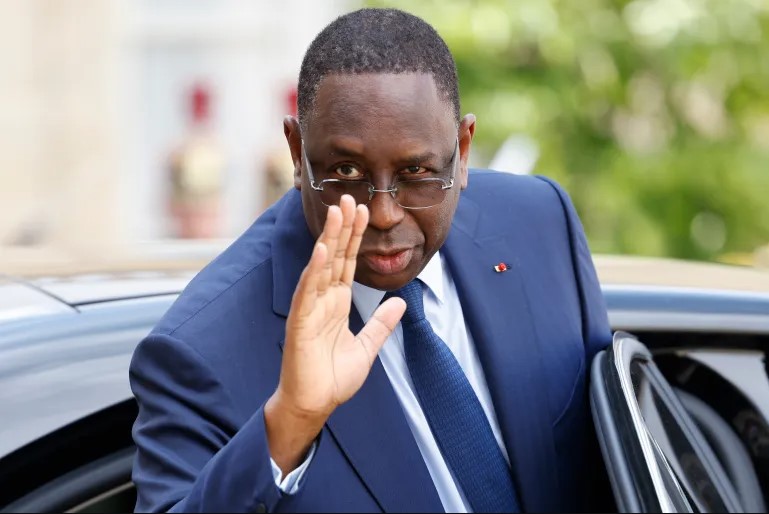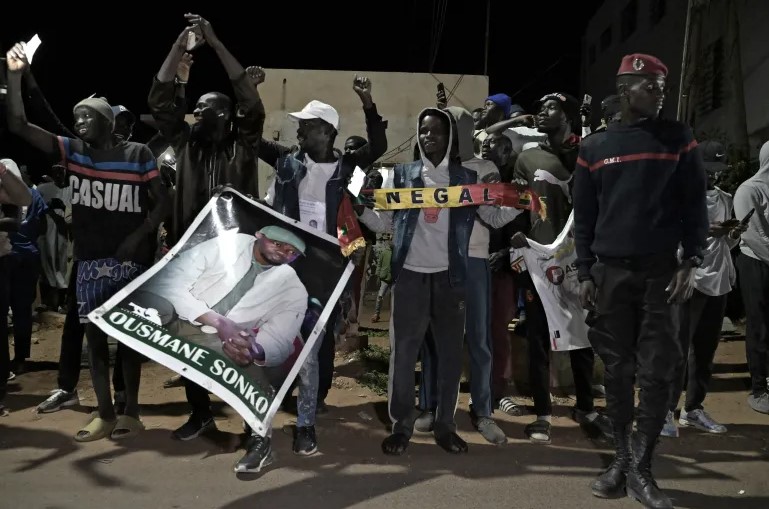From Prison to Presidency
Senegal’s politics look much different today than they did two days ago after the inauguration ceremony of President Bassirou Diomaye Faye has now officially taken place. President Faye now takes power as Senegal’s fifth President after his first round victory in the nations’ March 24th election with 54.28% of the vote. He defeated the ruling party candidate, former Prime Minister Amadou Ba, who came in second place with 35.47% of the vote.
“Senegal will be a country of hope, at peace, with an independent justice system and a stronger democracy” -President Bassirou Diomaye Faye in his inauguration speech
President Faye takes power at 44 years old, becoming both Senegal’s youngest ever President but also the present youngest elected President in Africa. He ran on a platform of anti-corruption, anti-establishment, tackling youth unemployment, and a renegotiation of a number of energy, mining, and defence contracts.

The new President has yet to have been out of jail for a month, having only been released on March 14th, 10 days prior to the election. He was released from prison alongside another key opposition leader, Ousmane Sonko.
Ousmane Sonko, previously the primary opposition candidate, was barred from running in the election and named President Faye as his replacement. Sonko witnessed extensive support amongst the nations’ youth, support he successfully passed down to President Faye.
Several hours after President Faye’s inauguration, he named Sonko as the nation’s new Prime Minister, finally answering the question of what role PM Sonko would be playing in the new government.
PM Sonko is now tasked with the formation of a new government, which the PM is the head of. It is his job as PM to compile a list of people to employ in government ministries and which ministries to have them head, a list which is subject to the advice of the President. The final list of Senegal’s new government ministers is to be approved by President Faye before the government officially forms.
Sonko’s appointment to Prime Minister gives him significant power in the new government. The Prime Minister is unelected, and specifically appointed by the President.
“We’ll give it everything we’ve got. We will spare no effort to achieve what we have promised the Senegalese: a break with the past, progress and definitive change in the country” -PM Sonko in his first speech following his appointment as Prime Minister

President Faye has not previously held any level of political office, having worked as a tax inspector with PM Sonko before he became involved in PM Sonko’s PASTEF party in 2014.
Some have raised concerns about the President’s lack of experience regarding governance, a point that was made by the ruling party during campaigning times, however many have also celebrated the fact that President Faye is from outside of the establishment, an establishment that President Faye claimed had failed the Senegalese people during his campaigning.
There are hopes among much of the populace that President Faye’s victory, the first time the opposition in Senegal has claimed a first round victory, will bring a level of stability to the nation that has been rocked by protests and political tension since 2021, largely resulting from the several arrests and the general legal troubles of PM Sonko. Massive protests were held throughout Senegal in support of the PM.
Both President Faye and PM Sonko, along with a number of others, were freed recently with the passage of former President Macky Sall’s Amnesty Law. The amnesty law has the ability to pardon charges related to political issues, in particular charges incurred during protests and other demonstrations, since 2021.

President Faye’s inauguration was attended by a number of different head’s of state, as well as representatives of other nations. An invitation to the inauguration was extended to every nation in ECOWAS, a West African economic bloc of which Senegal is a member. Nigerian President Bola Tinubu attended the inauguration personally. Nigeria heads ECOWAS, making him a key partner for President Faye.
The hand over of power from President Sall to President Faye went peacefully, something that was much appreciated in a region that has experienced several coups in the last few years.
A Troublesome Election
March 24th was not supposed to be the original date for the election. Originally, it was supposed to be held on February 25th, but was delayed.
On February 5th, the government attempted to delay the election, which was originally set for February 25th, for 10 months until December 15th. The government stated it was delaying the election pending a parliamentary inquiry into the independence of two of the judges on the Constitutional Court. The inquiry was opened after two key opposition candidates, Ousmane Sonko and Karim Wade, were barred from running for President by the Constitutional Court, who presides over the creation of the candidates list.
Karim Wade, another key opposition candidate and son of former Senegalese President Abdoulaye Wade, was barred due to his dual-citizenship with France. Karim renounced his French citizenship prior to running for election, however, and so presently he only holds Senegalese citizenship. Despite him only holding Senegalese citizenship at the time of the candidates list creation, the Constitutional Court still opted to bar him from running.
Notably, Karim Wade and former President Abdoulaye Wade both endorsed President Faye in the election. Both Sonko and Wade were still barred from the election when it took place on March 24th, with the issue of the candidates being barred from the list of 20 candidates having remained unsolved.
Following the vote to delay the election, which took place after a number of opposition MP’s were escorted out of parliament by police, protests broke out nationwide. There were hefty police crackdowns, with several hundred people being arrested, and three people dying during clashes with police.
??| Senegalese parliament votes to postpone elections with forced evacuation of opposition MPs
Honestly, the situation seems to be deteriorating to such an extent that there's a risk of major instability ahead.#Senegal https://t.co/TQagTgIKhD pic.twitter.com/bTQJmOGYDc
— Casus Belli (@casusbellii) February 5, 2024
On February 15th the Constitutional Court struck down the governments delay, ruling it “unconstitutional”. They stated that, while returning to the February 25th timeline would be “impossible”, that the government should seek to hold the election “as soon as possible”. The court also ordered that President Sall must step down from office on April 2nd, the original date of which his Presidential term is to end. While the President had stated he was not seeking a third term, and named PM Ba as his successor to run for election, under the government plan to delay the election until December 15th he would have remained in office until then.
President Sall conceded to the court, agreed to step down after his term end, and agreed to hold elections as soon as possible. However, for several weeks after the election delay was struck down, election dates were not set, bringing yet more protests from civilians and anger from opposition groups.
In an attempt to mitigate the crisis, President Sall opened a National Dialogue Commission which was to hold talks between him and opposition groups. However, the majority of opposition groups refused to participate in the commission. Regardless, the commission produced a potential election date: June 2nd. This election date was again ruled unconstitutional by the Senegalese Constitutional Council. Opposition groups opposed the June 2nd date, demanding a date that was before President Sall’s term end on April 2nd, not after.

Following this, election dates were set for March 24th. They were set a week into March, leaving less than a month for candidates to carry out campaign processes before the election.
President Sall has denied wrongdoing in his attempts to delay the election. The government had stated the delay was in the interest of holding “an open national dialogue to bring together the conditions for a free, transparent, and inclusive election,” however opponents accused President Sall and the ruling party of attempting to cling onto power and delay an election they feared losing, a fear which has now been proven right with President Faye’s victory.
As another piece of the governments attempts at reconciling the political crisis in the nation, they passed the amnesty law, the law which granted relief to those who had received politics based charges since 2021. Those arrested during February’s recent protests were included in the law’s amnesty grant.
The law also carries with it the capacity to excuse violent actions taken by police during protests, which led to dozens of casualties during protests in the last several years, including three fatalities in recent protests in February against the election delays, which have thus far gone unpunished. Those opposed to the law fear that it could allow police who had killed people during protests to continue to go unpunished, however many have celebrated the law as it brought the freedom of both President Faye and PM Sonko.

Much to Accomplish
President Faye and PM Sonko have a lot to accomplish if they are to hold to their campaign promises. They have committed to tackling youth unemployment, a problem that afflicts many African countries but particularly Senegal, where more than half of the population is aged 25 or younger. The view among the population that President Sall ignored this issue was a key factor in the decline of popularity of the ruling party during President Sall’s second term, which began in 2019.
Senegal is also set to begin producing oil and gas within 2024. As a part of President Faye’s campaign, he promised to re-negotiate many of the nations’ energy, defence, and mining contracts. The oil and gas production contracts are to be key in this, with the projects yielding large potential for Senegal, however many believe the contracts negotiated by the previous government will not fully capsulate the opportunity provided, and not provide Senegalese citizens with as many employment opportunities as it could.
Corruption is to be another difficult field to approach. Corruption is said to be one of the main inhibitors to the Senegalese economy. The nation has much economic potential through its large natural resource reserves, however it has failed to capitalize on many of these industries both due to corruption as well as slow business formalities.
President Faye’s victory also calls into question the future of the West African Franc (CFA) in the nation. The CFA is a regional currency amongst eight different West African states. It is tied to the Euro, and backed by France. President Faye stated that he would seek for Senegal to withdraw from its use of the currency and establish their own national currency, if the CFA could not be reformed.
His victory also calls into question the nations’ future relationship with France, a country who many in Senegal, and in West Africa in general, have come to view as neo-colonialist and exploitative in its relationships with its former African colonies, of which Senegal is one.
A common conversation topic prior to the President’s victory was a re-examination of the nations relationship with France. Which the re-examination does not explicitly state a negative development for France, it is unlikely to prove a positive one, however French President Emmanuel Macron has congratulated President Faye on his victory, and stated he looks forward to expanding relations and co-operation.
President Faye has stated that Senegal will continue to be “the safe and reliable ally” of foreign nations who are “committed to virtuous, respectful and mutually production co-operation.” The future of France in Senegal will seemingly depend on if President Faye determines this relationship to be “virtuous” and “respectful.”
France has suffered a number of losses in recent years in relations with several countries, largely at the hand of coups. Many nations have abandoned their relationships with France, their former colonial power, and sought either regional supports or, in several cases, support from Russia as an alternative to French support.

However, Senegal does not suffer many of the same problems as these countries, most (if not all) of which have ongoing insurgencies. Some of these nations border Senegal. There have been concerns amongst West Africa’s gulf states, such as Ghana, Togo, and Benin that some of these insurgencies could begin to spill over into their nations. There are similar fears along the coast, however Senegal benefits from a larger level of stability than most nations in the area.
Despite the challenges ahead, there is hope amongst much of Senegal’s population for the team of President Faye and PM Sonko.


